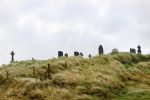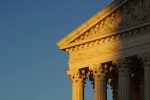Romans 8:1-11
Sep 2nd, 2022 | By Dr. Jim Eckman
Paul counsels on the doctrine of sanctification and the Holy Spirit as his answer to the struggles with the flesh in chapter 7.


Paul counsels on the doctrine of sanctification and the Holy Spirit as his answer to the struggles with the flesh in chapter 7.

In the 21st century, one of the major developments within American Christianity is the growing practice of cremation. Melissa Morgan Kelley of Christianity Today observes that “Surging cremation rates are upending traditional practices around death, as more people opt out of traditional church funerals and some skip communal experiences of grief altogether.” Historically, burning the body was associated with pagan practices and was often rejected by the Christian church.

Paul details the struggle at the heart of sanctification–between the flesh and the Spirit.

The photographs NASA has posted from the James Webb Space Telescope, orbiting 1 million miles above the earth, are amazing. As I viewed them and read the details about each photo, I thought of Psalm 19 where David announces, “The heavens declare the glory of God, and the sky above proclaims His handiwork. Day to day pours out speech and night to night reveals knowledge. There is no speech, nor are there words, whose voice is not heard. Their voice goes out through all the earth, and their words to the end of the world . . . .” [ESV]

Because we are dead to sin (6:1-14), we are no longer in bondage to sin and we are dead to the Law.

Over the years, one of the major arguments I have presented on Issues in Perspective is the Postmodern world’s passionate pursuit of personal autonomy. The term “autonomy” comes from two Greek words, “self” and “law.” In other words, autonomy is the pursuit of “self-law;” humans are a law unto themselves, or as the refrain from the end of the book of Judges puts it, “Everyone is doing what is right in their own eyes.” This pursuit of autonomy rejects universal ethical standards and most forms of authority.

As Paul begins his transition from justification to a discussion of sanctification, he constructs the new identity of those who have been justified by faith.

The First Amendment of the United States Constitution, ratified in 1791, begins: “Congress shall make no law respecting an establishment of religion, or prohibiting the free exercise thereof.” In other words, there will be no state (i.e., “established”) religion in the US, while the United States will protect and guard the “free exercise of religion.” Even a cursory reading of this Amendment indicates tension and the need to balance prohibiting the Congress from establishing a specific religion with the protection of individual citizens’ free exercise of religious beliefs.

Paul explains why, in terms of God’s redemptive plan, Adam and Jesus are the two most important people in history.

American culture in 2022 bears every evidence of a madness that defies reason and common sense. Quite frankly, it manifests an utter foolishness. As Chuck Colson used to declare, what was once unthinkable becomes debatable and gradually becomes acceptable. Such foolishness and madness reflects the downward spiral of evil explained by the Apostle Paul in Romans 1:18-32. Consider these three examples of cultural madness.